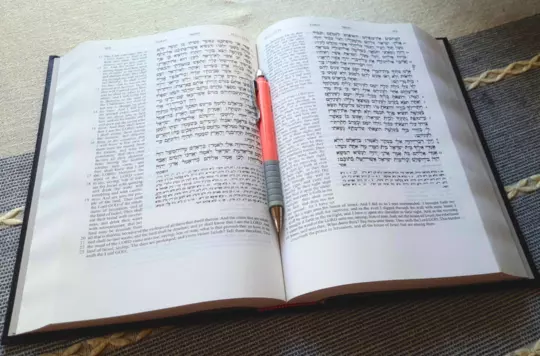15 May 2023
Call on the name of the Lord
Major Graham Mizon
Major Graham Mizon highlights the need for corporate as well as individual repentance.
Key text
Observing a change in the national mood in the years following the Second World War, the playwright and composer Sir Noel Coward wrote these humorous words: ‘There are bad times just around the corner,/ There are dark clouds hurtling through the sky/ And it’s no good whining, about a silver lining/ For we know from experience that they won’t roll by.’
These sentiments could be applied to today. There are so many ‘bad times just around the corner’ that I am starting to think twice before tuning into daily news bulletins. Joel must have lived and prophesied through a similar national mood. He opens his account by recording an invasion of locusts, a drought and a fire, all of which devastate the land.
Pause and reflect
- How should Christians prepare for ‘bad times’?
- How can we, as Christians, be bearers of good news and live counter to the national mood of our day?
Some scholars date Joel as early as the 9th century BC, while others place these events as late as the 5th century BC. My preference would be some time before the Babylonian exile of Judah in 586BC. If this can be accepted, then an invasion of locusts, a drought and a fire could be seen as actual events, or alternatively as apocalyptical visions of the impending destruction of Jerusalem, the desolation of Judah and the dispersion of the Jews into Babylonian exile.
Whatever the interpretation of these catastrophic events, Joel is warning of dark and gloomy days ahead when God will judge Judah (see Joel 2:2). It is as if Joel is saying: ‘When you consider the awful things going on in the world around you, can you not sense God’s displeasure?’
Joel brings attention to other trials: ‘The fields are ruined, the ground is dried up; the grain is destroyed, the new wine is dried up, the olive oil fails’ (v10). These are signs of God’s judgement upon Judah. Other Minor Prophets, such as Habakkuk and Haggai, painted very similar pictures, albeit for different reasons (see Habakkuk 3:8–18 and Haggai 1:5–11).
Pause and reflect
- Is it possible for us to interpret wars and troubles as signs of our times?
- How could we interpret Jesus’ words in Mark 13:8: ‘There will be earthquakes in various places, and famines’?
Having given a description of a devastating invasion of locusts in verses 2 to 4, Joel gives a prescription from verse 13 onwards. He is saying: this is where you are, and now this is what you should do about it. So the prophet calls the priests to seek forgiveness, and for the elders and the people to come together to repent and mourn (see v13).
Often, we view sin as an individual matter. In verse 14, we see that all the community is being called together to seek forgiveness and repent. Godly people, who have steadfastly loved and served God, will have also been in this community. Nevertheless, the whole nation is called together. God may judge individuals for their sinful actions, but here the burden of disobedience is laid upon the whole nation of Judah.
Pause and reflect
- When bad things happen to us, must this always mean that we have displeased God? Why or why not?
- Is there a place for corporate responses to God for our sins?
‘Declare a holy fast; call a sacred assembly … and cry out to the Lord’ (v14). In the Old Testament, mourning and repenting is often accompanied by a fast (see Judges 20:26; 2 Samuel 1:12; Nehemiah 1:4). Not only was Joel urging Judah to mourn for their nation and to weep for their sins, but he was also inviting them to return to God and be wholly devoted to him: ‘Return to the Lord your God, for he is gracious and compassionate, slow to anger and abounding in love’ (2:13).
It is interesting to note that, although there are many references to fasting in both the Old and New Testaments, it is only Joel who feels that he needs to describe it as a ‘holy fast’ in 1:14 and 2:15. Maybe this is because fasting can have many forms or perhaps because fasting can be used inappropriately (see Isaiah 58:1–14). The word ‘holy’, as used on both occasions in Joel, is qāḏaš in Hebrew – sacred, consecrated, dedicated, to set apart or to sanctify.
This was not to be a ritualistic fast that had no meaning or impact; rather, Joel called for a holy fast that the people would approach in a humble spirit and with a desire to repent of their sin and seek God’s love and forgiveness.
While Joel’s prophecy foretells God’s judgement, he also encourages those who will repent and turn back to the Lord. He declares: ‘Everyone who calls on the name of the Lord will be saved’ (2:32) and he utters words that Peter would later quote on the day of Pentecost: ‘I will pour out my Spirit on all people’ (2:28).
Pause and reflect
- Can you recall how God came and ministered to you during bad times?
Bible study by

Major Graham Mizon
Retired Officer, Burntwood
Discover more

Daniel Lloyd shares how the Terrain programme helped him grow in faith.

Major Graham Mizon reminds us that fulfilment is found in Jesus.

A useful guide to the different translations of the Bible to help you work out what Bible translation is best for you.

